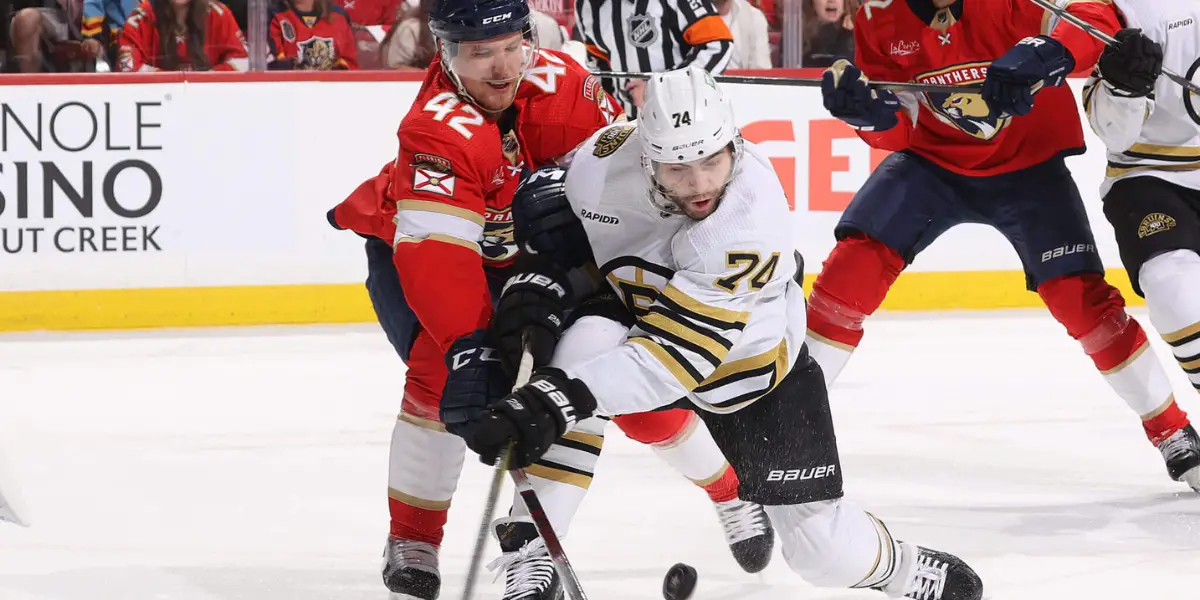
Over the course of the last two years under HC Paul Maurice, the Panthers have become one of the best if not the best defensive team in the NHL. Transitioning away from the high-scoring offense that won them the President’s Trophy they’ve been more focused on suppressing opposing offenses. This style of play has served them well getting the team to back-to-back Stanley Cup Finals and a Stanley Cup win. With that focus on defense, the defensemen carry more importance in their game plans in how they operate to stop the high-scoring players on the other side. While they did lose two pretty big pieces in Brandon Montour and Oliver Ekman-Larsson, they returned everyone else and added in some new players as well. This week we’ll look at the four returning defensemen on the Florida roster.
Gustav Forsling:
The star defenseman for the Panthers, Gustav Forsling, has garnered attention as one of the best shutdown defensemen in the NHL. He played minutes against some of the most offensively talented players in the league during the playoffs, like Nikita Kucherov, David Pastrnak, Artemi Parnin, and, of course, Connor McDavid. Forsling’s said in post-game interviews that his focus is always defense first, so putting up big numbers for goals isn’t high on his priority list. He’s like a great libero (defensive specialist) in volleyball, the better player they are the less you notice them until they make an amazing play. He has a talent for being in the right place at the right time, making a stick play that breaks up a scoring chance, or finding a way to block passing lanes that looked to be open. Forsling does it all defensively and frustrated top-end talent all last year, and on top of all that, he has a wicked wrister shot, too, that can cause goalies grief. He doesn’t put up the scoring numbers of Quinn Hughes or Cale Maker, but he doesn’t need to that’s not his game. HC Paul Maurice has said that Forsling is the best in the world at his style of play, and I’m inclined to agree that there are few players who can do what he does at the consistent level that he does. Looking at his stats, he played 79 regular season games last year, scoring 10 goals with 29 assists for 39 points and an NHL-leading +/- +56. He had one power-play goal and one game-winning goal while averaging 22:08 minutes on the ice. He sees very little power-play time, if any at all, but does rack up plenty of minutes playing on the top penalty kill unit. With the departure of Montour and OEL, he may step into the role of anchoring a power-play unit next season as well. Moving into the playoffs he played all 24 games and scored four goals with nine assists for 13 points and was +/- +9. Forsling had one game-winning goal and averaged 23:25 minutes a game on the ice. He got played a lot during the playoffs oftentimes in tandem with Barkov’s line, but he also played with Tkachuk’s line when the Panthers didn’t have last change. For shifts during the regular season, he was 2nd overall and 2nd among defensemen for total shifts at 2130, the only player above him was Mikkola who played all 82 games. Forsling led all players in shifts during the postseason at 729. Gustav Forsling anchors the Panthers’ defense, and they’ve extended him for eight more years at a very team-friendly $5.75M AAV. He’s arguably the best contract in the NHL, given that he could fetch upwards of $11.4M, according to The Athletic projection model.
Aaron Ekblad:
Forsling’s partner last season, Ekblad, missed some regular season games due to injury but did play all 24 postseason games. He’s been the subject of much discussion among Florida fans with the fanbase seemingly split on whether they like him or not, opinion seems to switch game to game based on how he plays. During the 51 regular season games, he scored four goals with 14 assists for 18 points and was +/- + 27. Ekblad had one power-play goal and one game-winning goal with an average ice time of 20:51. Ekblad is more noticeable on the ice as there are some games where there have been poor decisions made on his part. However, nearly every player at some point makes a bad call on the ice; just look at the response to Trouba’s decision making during the ECF. Ekblad’s been a career Panther since getting drafted in 2014, and HC Paul Maurice places enough trust in him to put him on that top pairing with Forsling. He’s a solid defenseman who also gets time on the penalty kill with Forsling, and he blocks a lot of shots. Ekblad doesn’t always make the highlight-reel-type plays that Forsling does but he still a strong defensive game, aggressive on the forecheck and backcheck, and willing to put his body on the line to keep a puck out of the net. In 24 playoff games, he scored one goal, had five assists for six points, and was +/- +4 while averaging 22:32 minutes of ice time. Playing with Forsling against the top talent in the league was no easy feat, but he managed it well. Ekblad had the 3rd least amount of shifts among the starters for the regular season at just 1333 but he only played 51 games, for the playoffs he had the 2nd most shifts among all players and all defensemen, just behind Forsling, at 719. The Panthers needed him to carry a heavy load for the playoffs and he stepped up to the challenge and delivered.
Niko Mikkola:
Niko Mikkola had what was one of the wildest sequences during the playoffs where he nearly scored an own goal and then about ten seconds later scored an actual goal to tie things up in Game 3 of the Cup Finals. Mikkola’s biggest strengths lie in his size and physicality, he’s able to go toe to toe with pretty much anyone in the league. Mikkola’s not afraid to put out a big hit on opponents, just look at the hit he gave to Matt Rempe during the ECF. He doesn’t score a lot of goals for the team but that’s not really his job, he’s there to forecheck, be physical, and win board battles. Mikkola played all 82 regular season games, scoring three goals with 14 assists for 17 points, and was +/- +11. He doesn’t spend time on the power play but does kill penalties for Florida and averaged 20:02 minutes of ice time. His biggest impact on the game isn’t necessarily going to be things that show up on the skating stats or scoresheet. He also played all 24 of the postseason games, scoring two goals with two assists for four points, and was +/- +4. No special teams goals or game-winning goals, but he did average 18:38 minutes of ice time. Mikkola’s pairing with Montour was played a bit less due to Forsling’s pairing being played more. He led the team in total shifts at 2175 for the regular season and was 4th among all players and 3rd among defensemen for the postseason, playing 683 shifts. Mikkola’s an important piece of the defensive puzzle that doesn’t get talked about much due to players like Forsling and Montour garnering more attention. Under HC Paul Maurice, he’s had a career-high year, getting the most assists and points of his career and finishing with the highest +/- differential he’s ever had. He’ll have a new defensive partner this year with Montour departing for Seattle, projections suggest he’ll be paired with Kulikov but he could end up with one of the incoming players as his partner. We’ll have to wait and see how things shake out from camp and the pre-season.
Dmitry Kulikov:
Signing a four-year extension during free agency, Kulikov is staying in Florida for the immediate future. He was paired with OEL last season, and they were a strong defensive pairing that made life difficult for the opponents’ bottom six forwards. Bill Zito said that Kulikov has stout defensive play and strong physicality, both qualities that were crucial to the Panthers winning the cup in an article following the announcement of Kulikov’s extension. At 33, the extension keeps him in Florida until he’s 37, at which point he may opt to retire. Kulikov played 76 regular season games and scored one goal with 19 assists for 20 points, making him one of the better assist defensemen on the team. He was +/- +15 on the season and averaged 16:30 minutes of ice time. Kulikov’s done well under HC Paul Maurice’s system, he scored five more points this year compared to last year when he was in Anaheim and went from being +/- -11 to +/- +15, the second highest +/- mark of his career; when he played for Minnesota during the 21-22 season, he was +/- +23. He played all 24 postseason games notching two assists for 2 points, although he was +/- -1 he spent most of the playoffs being positive, the Cup final brought down the whole team’s +/- stats with some bad games in the mix. While he only had 13:54 average time on ice, he made the most of it, being part of a solid paring that helped the bottom lines put in good shifts in the offensive zone. For shifts during the regular season, Kulikov took the 7th most out of all players and 4th most out of all defensemen at 1758. As for the postseason, he took the 4th least number of shifts out of all players and the least number out of all defensemen at 549. The highlight of his playoffs was the play he made in Game 7 of the Cup Final to keep a loose puck out of the net that then led to Sam Reinhart’s Cup-winning goal. Florida probably doesn’t win without those types of plays being made, and he’s a great player for that. He’ll also be getting a new defensive partner which will either be Mikkola or one of the new players coming in.
Up next week: The incoming defensemen and possible defensemen getting moved up from Charlotte.

ITR 47: Then There Was Nothing – Inside The Rink
Discover more from Inside The Rink
Subscribe to get the latest posts sent to your email.



